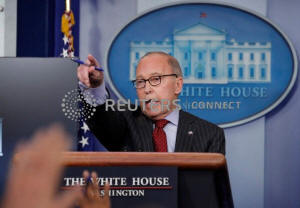|
White House to seek big domestic spending
cuts; budget will be late
 Send a link to a friend
Send a link to a friend
 [January 30, 2019]
By David Shepardson [January 30, 2019]
By David Shepardson
WASHINGTON (Reuters) - The White House will
propose significant non-defense spending cuts in its 2020 budget
proposal, officials said on Tuesday, but it will miss the Monday, Feb. 4
deadline for submitting its plan to U.S. Congress, where the new
Democratic majority in the House of Representatives plans to oppose it.
White House National Economic Council director Larry Kudlow told Fox
Business Network that the administration would propose a "very tough
spending" budget "in a few weeks" and call for at least 5 percent
across-the-board cuts in domestic spending. "Let's minimize government
where possible," Kudlow said.
A senior White House budget official who asked not to be named cited the
35-day partial government shutdown as the reason for the delay in
submitting its 2020 budget proposal.
The administration's proposal will face stiff resistance from Democrats
who have repeatedly opposed across the board spending cuts,
congressional aides said.

Representative John Yarmuth, the Democratic chairman of the U.S. House
Budget Committee on Tuesday told Reuters he and other senior Democrats
aim to write a fiscal blueprint this year that would cut annual budget
deficits by 50 percent in the next 10 years, possibly including tax
hikes on corporations and the wealthy.
Under law, the White House is supposed to send its proposal on the first
Monday in February but much of the White House budget office was
furloughed during the shutdown.
Another Trump administration official said the budget would not be
released before Trump's Feb. 5 State of the Union address and could be
delayed by several weeks or more.
[to top of second column]
|

White House economic adviser Larry Kudlow addresses reporters during
a press briefing at the White House in Washington, U.S., January 28,
2019. REUTERS/Jim Young

OMB is still reviewing budget submissions from Cabinet agencies, the
official said.
The White House delayed the 2019 budget proposal by one week in
February 2018 because of a brief government shutdown.
The U.S. budget deficit last year came in at $779 billion and is
projected to hover around $900 billion this year. But government
debt is rising at a significantly faster pace when counting interest
payments on that debt.
Washington started 2019 with a national debt of nearly $22 trillion,
amid slowing economic growth.
On Monday, the non-partisan Congressional Budget Office said that
unless Congress makes fiscal adjustments, the debt held by the
public will grow to 93 percent of the economy in 2029, its highest
proportion since just after World War Two, and to about 150 percent
of the economy by 2049, a level that many economists fear is
unsustainable.
(Reporting by David Shepardson; Editing by Sandra Maler and David
Gregorio)
[© 2019 Thomson Reuters. All rights
reserved.]
Copyright 2019 Reuters. All rights reserved. This material may not be published,
broadcast, rewritten or redistributed.
Thompson Reuters is solely responsible for this content.
 |